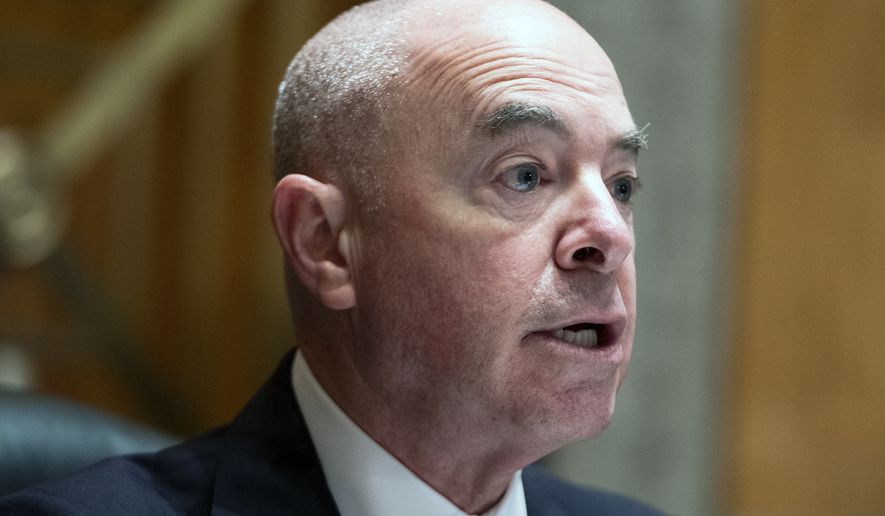Homeland Security Secretary Alejandro Mayorkas suggested his department has turned the corner on the border surge, telling senators Tuesday that the number of people being arrested this month has begun to tick down from the unprecedented level of July and August.
Under questioning from Republicans, Mr. Mayorkas defended his handling of the border and said the plans the Biden administration developed are beginning to bear fruit.
“It is, in fact, working. We have seen in the last several weeks, if not the month, a drop in the number of encounters at the United States border,” the secretary told the Senate Homeland Security and Governmental Affairs Committee.
He also projected confidence that his department has taken the right steps to dismantle the migrant camp of mostly Haitians that sprung up on the U.S. side of the Rio Grande, serving as a major breach of the border.
Mr. Mayorkas said the number of people in the camp has been cut to below 10,000, and some Haitians who showed up in northern Mexico eyeing the crossing have even begun to turn back, which he said was due to the get-tough approach.
That includes up to three deportation flights from Texas to Haiti each day.
“We’re hoping that what we are doing now serves as a deterrent because it backs up the words we have spoken,” the secretary said.
Sen. James Lankford, Oklahoma Republican, pointed out that 107,000 people this year have been caught and released on a promise that they would return to get a court date for their deportation proceedings. Nearly 30,000 of them have already missed their deadline to do so, meaning they are absconders.
Mr. Mayorkas promised they would be “a priority” for deportation, if they can be found.
The secretary also revealed the latest data on the Afghan evacuation, saying 60,000 people have been brought out of Kabul and have reached the U.S.
Of those, 7% were American citizens, 6% were legal permanent U.S. residents and 3% have been approved for the special visa reserved for Afghans who assisted the American war effort.
The rest, he said, include people who may be eligible for the special visa but haven’t yet been processed, or people who would have qualified as refugee priorities had they remained outside the country. They have been admitted under Mr. Mayorkas’ parole authority.
About 60,000 others are believed to still be at sites outside the U.S. awaiting more vetting and processing.
Mr. Mayorkas said very few Afghans have been flagged and denied entry to the U.S. He said it was a “de minimis” amount.
“We have not found many people with derogatory information relative to those who qualify for admission to the United States by reason of their status,” the secretary said.
Mr. Mayorkas testified alongside FBI Director Christopher Wray and National Counterterrorism Center Director Christine Abizaid, addressing the threats to homeland security 20 years after the terrorist attacks on New York and Washington.
They acknowledged a changed environment after the withdrawal of U.S. troops from Afghanistan, though only Mr. Wray said they expect more threats now.
He said the FBI generally has about a thousand ongoing investigations into people radicalized here in the U.S. by foreign terrorist organizations, and that number had held steady.
But he said he expects that to change.
“We are concerned there will be more inspiration,” he said.
Still, domestic violent extremists remain a bigger part of the FBI’s workload, with 2,700 current investigations, up from about a thousand just a few years ago. Mr. Wray said he expects that domestic figure to rise along with the foreign-inspired extremist situation.
• Stephen Dinan can be reached at sdinan@washingtontimes.com.




Please read our comment policy before commenting.